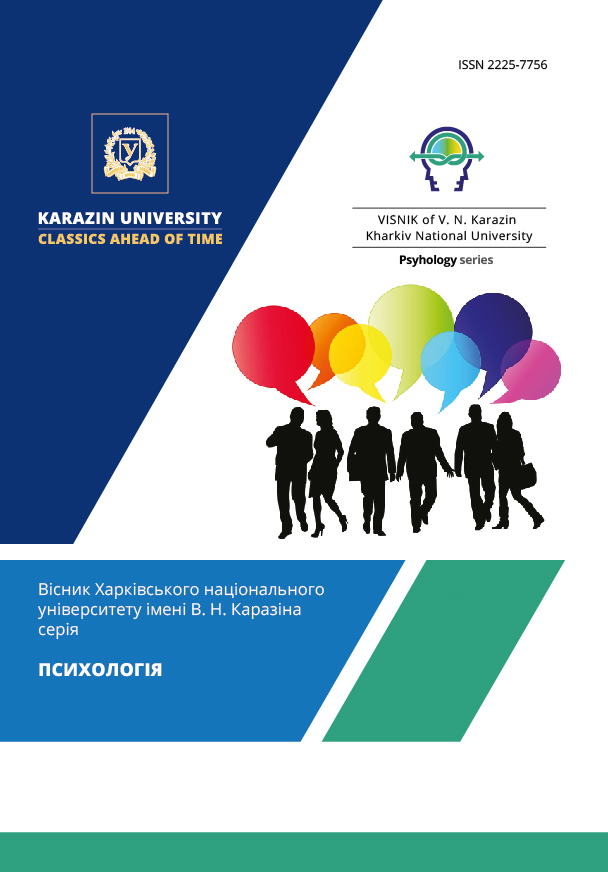PSYCHOLOGICAL SPACE BAUNDARIES AND COMMUNICATIVE TOLERANCE OF EARLY ADOLESCENTS
Abstract
The link between psychological boundaries and the tolerance of adolescents is analyzed. It is mentioned, that the level of tolerance of different people is different and depends on some factors and is characterized by various types according to the object of tolerance-intolerance: ethnic (to another ethnicity), confessional (to another religion), intercultural (to another culture), gender (to another gender), sexual (to another sexual orientation), medical (to another state of health), age (to another age), class (to another social group).
This investigation is concentrated on communicative tolerance highlighted by V. Boiko. The scientist underlines that a person with a high level of communicative tolerance is characterized by the ability to communicate with different people, creating a psychologically comfortable environment for collaboration. The lack or low level of communicative tolerance impedes successful communication in the social, professional or domestic sphere. The author identifies several categories of communicative tolerance: situational, manifested as a personal attitude to a particular person; typological, manifested in an individual or group of a certain type people (nationality, race, social group); professional, manifested between participants in the relationship in the professional field; general communicative tolerance.
The hypothesis about the dependence of the level of communicative tolerance on the characteristics of personal boundaries was confirmed. It has been found that adolescents are mostly marked by thin boundaries of psychological space and average distance from others. It has been researched that middle and high levels of communicative tolerance are predominantly characteristic of adolescents. It is noted that the level of communicative tolerance of students meets the requirements of the future profession. Three types of border carriers with their features are considered. It has been found that “open” young people are characterized by a higher level of communicative tolerance than “closed” ones.
Downloads
References
Буравлева Н.А. Развитие толерантности у подростков в условиях объединения дополнительного образования. Вестник Томского государственного педагогического университета. 2012. №6 (121). 214-218. URL: https://cyberleninka.ru/article/n/razvitie-tolerantnosti-u-podrostkov-v-usloviyah-obedineniya-dopolnitelnogo-obrazovaniya/viewer
Бурмистрова А.В. Личностные особенности средового поведения, направленного на регуляцию границ бытийного пространства. Автореферат диссертации на соискание ученой степени кандидата психологических наук. Краснодар. 2004. URL: http://nauka-pedagogika.com/viewer/116899/a?#?page=1
Волинчук О.В. Навчальна група як середовище вивчення психологічних меж підлітків. Науково-практична конференція «Актуальні питання теорії та практики в галузі права, освіти, соціальних та поведінкових наук – 2020». Чернігів. 2020. 214-217. URL: http://academysps.edu.ua/wp-content/uploads/2020/04/Zaochna-mizhnarodna-naukovo-praktichna-konferencija-Aktualni-pitannja-teorii-ta-praktiki-v-galuzi-prava-osviti-socialnih-ta-povedinkovih-nauk-2020-T.1_24.04.20.pdf
Жмырова Е.Ю. О понятии толерантность и ее видах. Вестник Тамбовского государственного технического университета. 2006. Том 12. № 4-2. URL: https://cyberleninka.ru/article/n/o-ponyatii-tolerantnost-i-ee-vidah/viewer
Емелин В.А., Рассказова Е.И., Тхостов А.Ш. Разработка и апробация методики оценки изменения психологических границ при пользовании техническими средствами (МИГ-ТС). Психологические исследования. 2012. №2 (22). URL: http://psystudy.ru/num/2012n2-22/655-emelin22
Колесниченко М.Б., Серова В.В. Этническая толерантность: опыт разведывательного исследования. Вестник Пермского национального исследовательского политехнического университета. 2018. № 4. URL:https://cyberleninka.ru/article/n/etnicheskaya-tolerantnost-opyt-razvedyvatelnogo-issledovaniya/viewer
Леви Т.С. Телесно-энергийный подход к пониманию психологической границы человека. Научные труды Московского гуманитарного университета. 2017. №2. URL: https://journals.mosgu.ru/trudy/article/view/448
Рашидова З.Г. Характеристики толерантности верующих првославной и исламской идентификации. Вестник Российского университета дружбы народов. Серия: Психология и педагогика. 2011. №5. URL: http://journals.rudn.ru/psychology-pedagogics/article/view/7930
Силина О.В. Формирование психологических границ у детей 2-7 лет. Современное дошкольное образование.. 2018. № 1. URL: https://sdo-journal.ru/journalnumbers/silina-ov-formirovanie-psihologicheskih-granic-u-detej-27-let.html
Тодорцева Ю.В. Педагогіка толерантності як концептуальна основа професійної діяльності викладача вищої національної школи. [Електронний ресурс]. 2011. URL: http://nbuv.gov.ua/UJRN/Nvpupupp_2017_2_20
Толстоухова И.В. Формирование межэтнической толерантности у студентов вуза. Современные этнические процессы на территории центральной Азии: проблемы и перспективы. 2019. № 24. URL: https://cyberleninka.ru/article/n/formirovanie-mezhetnicheskoy-tolerantnosti-u-studentov-vuza/viewer
Тхостов А.Ш. Психология телесности. М. 2002. 287 с. URL: https://studfile.net/preview/6749396/
Шамшикова Е.О. Особенности взаимосвязи типов психологических границ и защитных механизмов личности в старшем подростковом возрасте (межнациональные различия). Сибирский педагогический журнал. 2014. № 6. URL: https://cyberleninka.ru/article/n/osobennosti-vzaimosvyazi-tipov-psihologicheskih-granits-i-zaschitnyh-mehanizmov-lichnosti-v-starshem-podrostkovom-vozraste/viewer
Яковлева Н.В. К вопросу о формировании толерантности в подростковой и молодежной среде. Теория и практика общественного развития. 2015. № 9. URL:https://cyberleninka.ru/article/n/k-voprosu-o-formirovanii-tolerantnosti-v-podrostkovoy-i-molodezhnoy-srede/viewer
Яроцька А.С. Особливостi психологiчних меж особистостi у спiвзалежних стосунках в парi. Наука і освiта. 2013. №1 – 2. URL: http://nbuv.gov.ua/UJRN/NiO_2013_1-2_29.
Brown Nina W. Coping with infuriating, mean, critical people: the destructive narcissistic pattern. Westport: ABC-CLIO. 2006. https://www.bookdepository.com/Coping-with-Infuriating-Mean-Critical-People-Nina-W-Brown/9780275989842
Ivashkevych E., Prymachok L. Psycholinguistic Peculiarities of the Development of Communicative Competence of Teachers of Secondary Schools. Psycholinguistics. 2020. No. 27(1). https://doi: 10.31470/2309-1797-2020-27-1-95-12
Tarasyuk I. Speech Competence Testing and Assessment: German Approach. East European Journal of Psycholinguistics. 2019. Vol. 6. No.1.
https://doi.org/10.5281/zenodo.3383010
Volynchuk O. Functions of Students’ Psychological Boundaries. Матеріали Всеукраїнської науково-практичної конференції для студентів, аспірантів, докторантів, молодих учених «Наука та освіта в дослідженнях молодих учених». Харків. 2020. C. 57.
Citations
Features of interpersonal relationships in adolescents with internet addiction
Myloslavska O., Huliaieva O. & Farafonova-Nekrasova O. (2023) Visnyk of V. N. Karazin Kharkiv National University. A Series of Psychology
Crossref




